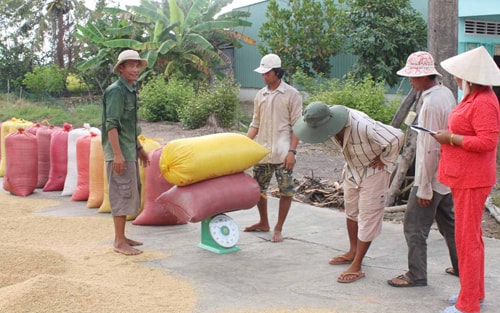Regulations on floor prices for rice purchases are causing losses to farmers.
Currently, the purchase price still depends entirely on the ability of businesses to sign export contracts; farmers do not have the right to bargain.
Floor price regulations cause harm to farmers
According to the Alliance “For Farmers' Rights and the Efficiency of Vietnamese Agriculture” (Agricultural Alliance), both the policy of regulating the floor price for purchasing rice and the policy of purchasing and temporarily storing rice have many shortcomings and do not bring real benefits to farmers.
 |
| The policy on temporary storage of rice still has many shortcomings. |
Dr. Nguyen Duc Thanh, a research team from the Agricultural Alliance, said that the policy of regulating the floor price for purchasing rice, ensuring farmers make at least 30% profit, has good intentions for farmers, but in reality causes losses to farmers.
Because, according to the survey of this Union, determining the cost of rice production is quite complicated in terms of statistics and time costs to ensure accuracy, and to be representative of the common rice production of a region. The rapid fluctuations of the market of input factors such as fertilizers, pesticides, or labor prices, etc. will make the determination of costs at each point in time constantly change.
Furthermore, in the Mekong Delta, businesses mainly purchase rice through traders, so the price that farmers receive is always lower than the company's purchase price.
If based on the announced figures, the production cost of rice in the Mekong Delta provinces is in a very wide range, for example from 3,742 - 4,908 VND/kg as applied to the Summer-Autumn crop in 2014, then businesses are almost certain to purchase rice from farmers at above this technical cost, plus 30% "profit" as expected by the policy.
With such a formed (expected) purchasing price, rice exporting enterprises tend to negotiate to sell rice at low prices to foreign countries and in turn pressure the farmers. Therefore, farmers always enjoy low profits due to the pressure of purchasing enterprises on prices. Moreover, farmers will not be interested in growing high-quality rice varieties because the cost of growing these rice varieties is higher. This floor price invisibly creates a "standard" for purchasing rice that is disadvantageous to farmers who grow high-quality rice varieties under agricultural contracts with rice exporting enterprises.
Thus, "this policy not only does not bring more profits to farmers but also unintentionally sabotages the policy of encouraging farmers to switch to growing high-quality rice varieties" - Dr. Nguyen Duc Thanh, research team of the Agricultural Alliance, assessed.
Therefore, Mr. Thanh proposed: The determination of rice prices must have more voice of rice growers. Members of the "Rice Price Committee" include representatives of the Ministry of Agriculture and Rural Development, the Ministry of Industry and Trade, representatives of rice exporting enterprises, and representatives of the Rice Farmers Association.
Farmers do not directly benefit from the temporary storage purchase policy.
The policy of temporary purchase and storage is implemented in parallel with the policy of ensuring farmers have a profit of at least 30%. According to many analyses, the effectiveness of this policy is not really clear. Pointing out these ambiguities, according to Dr. Nguyen Duc Thanh: Firstly, Vietnamese farmers do not directly benefit from this policy. Unlike the temporary purchase and storage policies of Thailand and India, where state-owned enterprises buy rice at a minimum price directly from farmers, in Vietnam, enterprises buy rice for temporary storage from traders. This policy only brings indirect benefits to farmers if rice prices increase again.
Second, the subsidy in the form of interest rate support for businesses buying and storing for a period of time (3 months) is essentially a free subsidy on storage costs for businesses because any business usually has to store a certain amount of rice.
Furthermore, businesses have the option to sell the entire stock in the reserve fund and accept no interest. With this policy, the amount of rice purchased from the reserve policy is actually not much.
The purchase price still depends entirely on the ability of the enterprise to sign an export contract. And that is the reason why in the four times of temporary storage purchase from 2009 to 2012 (summer-autumn crop in 2009, 2010; winter-spring crop in 2011 and 2012), there were 2 failures, the purchase price of rice continued to decrease instead of increasing again.
This alliance proposes that the Government should amend this policy as follows: when the market price of rice falls below the price announced by the Rice Price Committee, the State will allow agricultural cooperatives to borrow money according to the volume of rice that members are temporarily storing to advance a certain amount of money to meet the urgent needs of farmers. When the price of rice increases again, they will sell the rice and return the advance payment from the State. The amount of rice temporarily stored will be supported with a maximum of 100% interest for agricultural cooperatives. Thus, farmers will fully enjoy the support of the State.
According to VOV.VN






